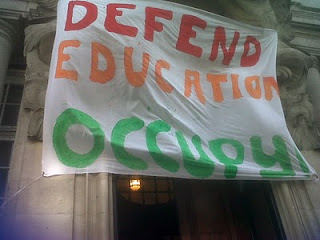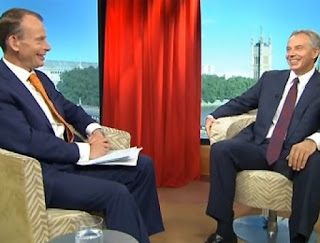
I recently had a discussion with my mum about peaceful protesting. She said that in her view violence was never justified. Expressing your political ideologies through violence puts you in the same bracket as suicide bombers and other extremists. She said that peaceful protest was the only civilised way to exercise your democratic rights, and to make sure that public opinion is with you. If public opinion is with you, then leaders will have to listen to you.
I agreed, and stated that in no way did I condone violence towards individuals - from either protestors or the police. I hate the met with a passion, but would not assault an officer, and would not condone anyone I knew doing so (except in very extreme circumstances - never say never, eh?)
However, I said - sometimes peaceful protest is not enough. I used the student protests as an example (as she had not yet read my blog - thankfully she is not one of those mums who comments on my facebook statuses). The point I made was this - sometimes in order to negotiate with someone, you must force them to sit at the negotiation table. I reiterated my point from the previous post about a march being too easy to brush aside. Without Millbank, I could literally imagine Cameron getting back from China to see that all was as it was, and saying to himself that "the cuts were hard to swallow, but necessary and right. These left-wing loons will protest about anything anyway, won't they?", as he continues going about the business of destroying life in Britain for the majority of people. The reports of him anxiously watching the events at Millbank unfold on TV in his hotel room encourage me that we have at least forced his attention.
When you are faced with a government who are as close to unelected as you could reasonably get in 21st Century Britain (the majority needed for parliament only being made after an uneasy and - it has now proved - completely uneven coalition with a party whose election promises are disappearing faster than housing benefits), and who seem determined to unleash the deepest, fastest, and most ideologically-driven cuts in 90-odd years upon a public who not only have had almost no say in them, but are also not even being allowed to fully know the extent of them - that is when voicing your dissent through the means of peaceful protest is no longer enough.
This government, in its short tenure, has already proved that not only is it more than willing to renege on any and every pre-election promise under the shadowy banner of the coalition 'agreement', but it is also willing to push forward with the most extreme measures seen on these shores in almost a century of governance, and it is willing to do this with little or no consultation, and with almost immediate effect.
This government, in my opinion, is not a government with whom peaceful demonstration will work. Showing this government that we do not agree with them is futile. They already know they are deeply unpopular, and do not seem to mind. They are set upon their ideological task, pushed forward by the values which they hold, certain that they are correct. What is needed is to force them into engaging with the public - and once there, to set forth a compelling enough argument so that they have no choice but to negotiate.
As Des Freedman said last week, the violence here is not in the few smashed windows, but in the destruction of the cuts. Direct action - in the form of walk-outs, strikes, and occupations - if done properly, has the potential to force the ConDem's to engage with pubic opinion. To come to an agreement. To find a middle ground.
Aung San Suu Kyi, an international symbol of peaceful resistance, was freed on Saturday after spending 15 of the past 21 years under house arrest in Burma. Upon her release, she said, "There is a time to be silent and a time to talk. People must work in unison. Only then can we achieve our goal". This is our time to talk, and this is our time to force the government to listen. We do not have 15 years. Time is not on our side. If the current government gets its way, it will be too late by midway through next year. We must organise, resist, and occupy. We must force the ConDem's hand. If they won't sit at our table and negotiate, we must put the table in front of their door so that they cannot leave without sitting at it.
I have been in and around other succesful occupations - when done properly, they work. We should re-occupy Millbank. But we should also target the Lib Dem's, who made this government possible. If we can break the coalition, we can enact change. The British may not be used to large-scale protest and direct action, and the 80's may have suffocated much of the air from this political spirit, but this government has inadvertantly breathed new life into it. Now is its time to live again. Now is the time for direct action. Now is the time to effect change.
I agreed, and stated that in no way did I condone violence towards individuals - from either protestors or the police. I hate the met with a passion, but would not assault an officer, and would not condone anyone I knew doing so (except in very extreme circumstances - never say never, eh?)
However, I said - sometimes peaceful protest is not enough. I used the student protests as an example (as she had not yet read my blog - thankfully she is not one of those mums who comments on my facebook statuses). The point I made was this - sometimes in order to negotiate with someone, you must force them to sit at the negotiation table. I reiterated my point from the previous post about a march being too easy to brush aside. Without Millbank, I could literally imagine Cameron getting back from China to see that all was as it was, and saying to himself that "the cuts were hard to swallow, but necessary and right. These left-wing loons will protest about anything anyway, won't they?", as he continues going about the business of destroying life in Britain for the majority of people. The reports of him anxiously watching the events at Millbank unfold on TV in his hotel room encourage me that we have at least forced his attention.
When you are faced with a government who are as close to unelected as you could reasonably get in 21st Century Britain (the majority needed for parliament only being made after an uneasy and - it has now proved - completely uneven coalition with a party whose election promises are disappearing faster than housing benefits), and who seem determined to unleash the deepest, fastest, and most ideologically-driven cuts in 90-odd years upon a public who not only have had almost no say in them, but are also not even being allowed to fully know the extent of them - that is when voicing your dissent through the means of peaceful protest is no longer enough.
This government, in its short tenure, has already proved that not only is it more than willing to renege on any and every pre-election promise under the shadowy banner of the coalition 'agreement', but it is also willing to push forward with the most extreme measures seen on these shores in almost a century of governance, and it is willing to do this with little or no consultation, and with almost immediate effect.
This government, in my opinion, is not a government with whom peaceful demonstration will work. Showing this government that we do not agree with them is futile. They already know they are deeply unpopular, and do not seem to mind. They are set upon their ideological task, pushed forward by the values which they hold, certain that they are correct. What is needed is to force them into engaging with the public - and once there, to set forth a compelling enough argument so that they have no choice but to negotiate.
As Des Freedman said last week, the violence here is not in the few smashed windows, but in the destruction of the cuts. Direct action - in the form of walk-outs, strikes, and occupations - if done properly, has the potential to force the ConDem's to engage with pubic opinion. To come to an agreement. To find a middle ground.
Aung San Suu Kyi, an international symbol of peaceful resistance, was freed on Saturday after spending 15 of the past 21 years under house arrest in Burma. Upon her release, she said, "There is a time to be silent and a time to talk. People must work in unison. Only then can we achieve our goal". This is our time to talk, and this is our time to force the government to listen. We do not have 15 years. Time is not on our side. If the current government gets its way, it will be too late by midway through next year. We must organise, resist, and occupy. We must force the ConDem's hand. If they won't sit at our table and negotiate, we must put the table in front of their door so that they cannot leave without sitting at it.
I have been in and around other succesful occupations - when done properly, they work. We should re-occupy Millbank. But we should also target the Lib Dem's, who made this government possible. If we can break the coalition, we can enact change. The British may not be used to large-scale protest and direct action, and the 80's may have suffocated much of the air from this political spirit, but this government has inadvertantly breathed new life into it. Now is its time to live again. Now is the time for direct action. Now is the time to effect change.


